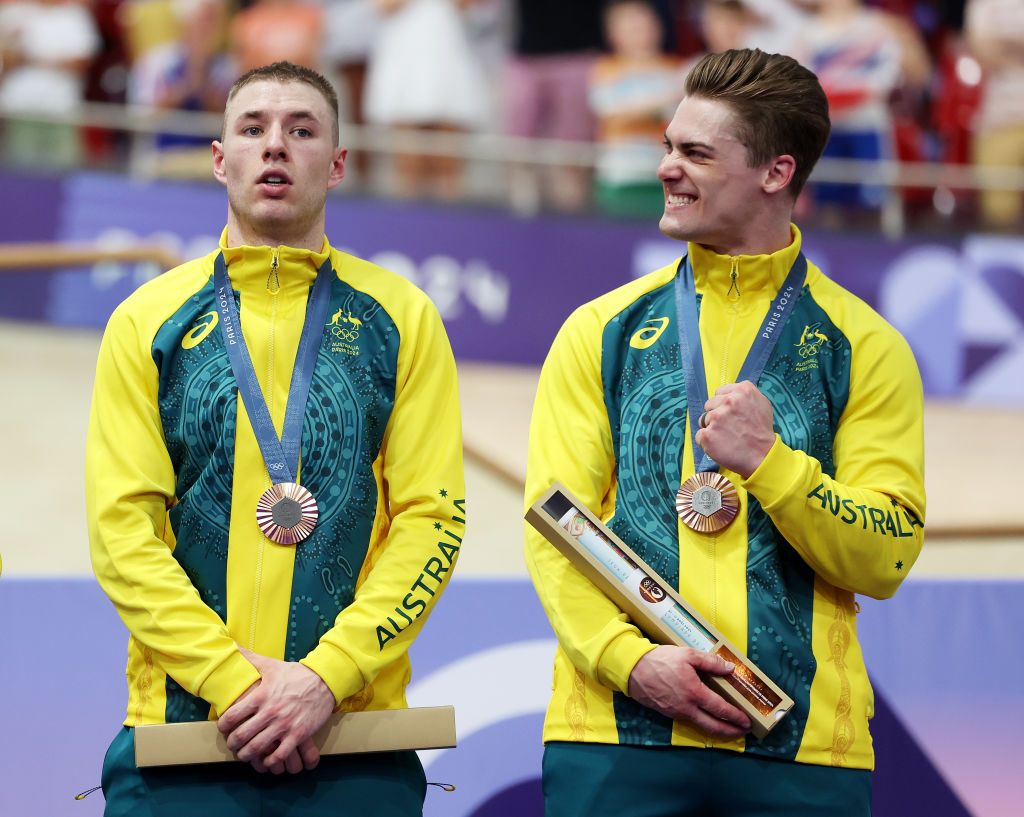The heartbreak of fourth had become all too a familiar a feeling for Australia’s Matthew Glaetzer at the Olympic Games, after all he had lined up in the bronze medal showdown for the men’s Team Sprint in London, Rio and Tokyo and then walked away empty-handed every time. Paris, however, was different.
The Australian squad of Glaetzer, Matthew Richardson and Leigh Hoffman lined up at Vélodrome National de Saint-Quentin-en-Yvelines to take on the home town favourites of France, who had beat them to bronze in Tokyo, but this time they turned the tables. Australia claimed bronze and finally Glaetzer had the medal he had fought so hard for over the last 12 years, clinching it in what is expected to be his last Olympic Games.
“After Tokyo, I was very close to giving the sport away, but I stuck at it. I mean, obviously overcoming cancer, a big injury in the lead up to Tokyo, and then for our Tokyo preparation not to go well, it was pretty tough,” said the 31-year-old who was diagnosed with thyroid cancer in 2019. “And elite sport can be pretty brutal when you don’t get the result that you aim for. And I pushed through it and came to this Olympics with the teammates that I had, and knew we could do something great for Australia.”
Of course the dream was to fight for gold in the Team Sprint, but after the rounds had played out it was Netherlands and Great Britain that secured the right to battle for the top two spots, which meant bronze was the only medal in reach. Though with a first round performance of 42.336, Australia knew it would have to do better to avoid missing out on a medal all-together for a fourth time in a row.
“Leigh and Richo are just so fast, and they were lighting it on fire in front of me, and I wasn’t quite there, and I knew that we couldn’t afford to do that again in the final and wasn’t willing to risk that,” said Glaetzer after the event. “I was pretty confident that we could go faster if we mixed it up and to unleash their horsepower in the back end with some sort of a decent first lap that I could do.”
Glaetzer moved to starter duties in the decider, Hoffman became the second man and then it was Richardson’s turn. The result was a bronze medal securing time of 41.597, with the French squad coming in behind with 41.993.
“Very proud of them to deliver that, and us as a team to to make that call and to take the risk,” said Glaetzer. “Because, yeah, we knew that we weren’t going to leave any question unanswered, and we were willing to do anything to win that medal, and that meant rolling the dice, mixing it up, and it paid off.”
That means no matter what happens next in the remaining contests, with Glaetzer also on the start list for the Men’s Sprint and the Men’s Keirin, he will get to walk away as an Olympic Games medallist.
“This bronze is like a gold to me,” Glaetzer said in an AusCycling release.
“I’ve lived through a lot of heartbreak – in every team sprint Olympic final, we’ve been on the losing side in the bronze final,” he said in France. “It’s been very tough, but to finally come out on the winners side of it was pretty special.”

